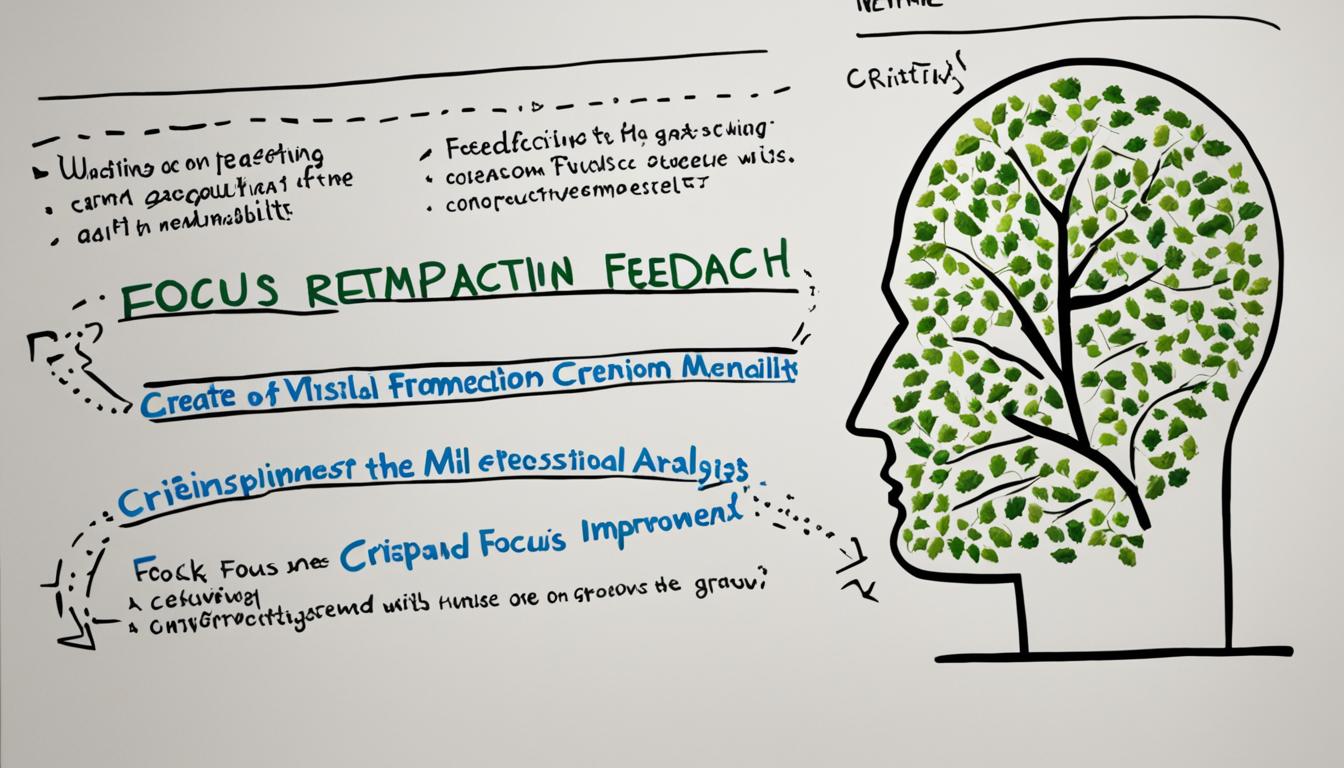Golf is a game that requires both physical skills and mental focus. While we often focus on improving our swing and technique, the mental aspect of the game is equally important. Developing a strong golf mindset can greatly enhance your performance on the course and help you reach your full potential.
In this article, we will explore various golf mental strategies and provide you with tips and techniques to improve your golf mindset. Whether you are a beginner or an experienced player, incorporating these mental game techniques into your practice routine can make a significant difference in your overall game.
Key Takeaways:
- Mastering the mental game is essential for improving your performance and enjoyment of golf.
- Developing a strong golf mindset involves cultivating a positive mindset, managing negative thoughts, and staying focused.
- Building mental toughness is crucial for handling pressure and performing well in challenging situations.
- Practicing mental game techniques, such as visualization and staying calm under pressure, can enhance your overall performance on the course.
- Overcoming mental challenges and obstacles in golf requires strategies such as positive self-talk and reframing setbacks as learning opportunities.
The Significance of the Mental Game in Golf
The mental game in golf is often referred to as the “90% of golf.” While technical skills and physical abilities are important, the mental aspect of the game can make or break a player’s performance. Understanding the importance of the mental game is the first step towards improving your overall game.
When it comes to golf, the mental aspect impacts every aspect of your game. It affects your shot selection, execution, focus, and decision-making, especially under pressure. Maintaining a strong mental mindset can help you stay calm and focused, leading to more consistent and successful shots.
Developing a golf mindset involves honing various mental skills such as visualization, positive self-talk, and the ability to manage emotions and mental pressure. By doing so, you will be better equipped to handle challenging situations on the course and maintain a winning mentality.
“The mental game is the key to unlocking your full potential in golf. It influences how you approach each shot, how you handle setbacks, and how you stay focused under pressure.” – Golf Pro, Jason Johnson
Ultimately, the mental aspect of golf can be the difference between a good golfer and a great one. It allows you to harness your physical skills effectively and perform at your best, even in high-stakes situations. By prioritizing your mental game and investing in mental training and techniques, you can take your golf game to new heights.
Developing a Strong Mental Approach
Developing a strong mental approach is crucial for success in golf. It goes beyond physical skills and encompasses the mindset needed to excel on the course. By cultivating a positive mindset, managing negative thoughts, and staying focused, you can enhance your overall performance and achieve better results.
A positive mindset sets the stage for success in golf. When you approach each shot with confidence and optimism, you increase your chances of executing it flawlessly. Positive self-talk plays a vital role in maintaining a strong mental approach. Remind yourself of your capabilities, focus on past successes, and believe in your abilities. Visualize each shot going exactly as planned, reinforcing positive thoughts and reinforcing your confidence.
Managing negative thoughts is equally important. Golf is a game of precision and consistency, and negative thoughts can easily overshadow your performance. When a negative thought arises, acknowledge it and let it go. Reframe it into a positive or neutral perspective. For example, if you miss a shot, instead of dwelling on the mistake, focus on the opportunity to improve your next shot. This shift in mindset helps maintain a strong mental approach and keeps you focused on the present moment.
Staying focused throughout your round is essential for playing your best. Distractions are abundant in golf, but learning to center your attention on each shot is key. Mindfulness techniques, such as deep breathing and being fully present in the moment, can help you stay focused and perform at your peak. Be aware of your surroundings, the feel of the club in your hands, and the target in front of you. By staying focused, you heighten your chances of executing each shot with precision.
Benefits of a Strong Mental Approach in Golf
A strong mental approach in golf offers several benefits that can positively impact your game. These include:
- Improved confidence and belief in your abilities
- Enhanced resilience in the face of challenges
- Increased focus and concentration
- Improved decision-making under pressure
- Reduced performance anxiety
By developing and maintaining a strong mental approach, you can unlock your full potential as a golfer and elevate your game to new heights. Remember, golf is not just a physical sport; it is also a mental one. Nurture your mind, cultivate a positive mindset, and stay focused to achieve success on the course.

| Techniques for Developing a Strong Mental Approach in Golf | |
|---|---|
| Positive self-talk | Fuel your mind with positive affirmations and belief in your abilities. |
| Visualization | Imagine each shot going perfectly according to plan, boosting your confidence. |
| Mindfulness | Stay present and focused in the moment, reducing distractions and enhancing concentration. |
Strategies for Building Mental Toughness
Mental toughness is a vital trait for golfers aiming to excel in challenging situations. The ability to stay resilient, composed, and perform well under pressure can make a significant difference in your game. While building mental toughness takes time and practice, incorporating specific techniques into your routine can enhance your performance on the golf course.
Visualization: Seeing Success Before It Happens
One effective technique for building mental toughness is visualization. By vividly imagining yourself executing successful shots and navigating challenging situations, you can develop the mental fortitude needed to handle pressure effectively. When utilizing visualization, engage all your senses to create a realistic and immersive mental experience that mimics being on the course. Imagining each shot with precision and focus will help instill confidence and resilience into your psyche.
Positive Self-Talk: Encouragement from Within
The power of positive self-talk cannot be underestimated when it comes to building mental toughness. Turn negative thoughts into positive affirmations and remind yourself of your strengths and past successes. By consistently feeding your mind with uplifting and empowering statements, you can boost your confidence and maintain a resilient mindset, even when facing adversity. Remember, the way you speak to yourself has a direct impact on your performance.
Embracing Adversity: Growth Opportunities in Challenges
Instead of avoiding or fearing difficult situations, embrace them as opportunities for growth. Mental toughness is built by facing adversity head-on and learning from setbacks. Every challenge you encounter on the course is a chance to develop resilience and perseverance. Embracing adversity fosters a growth mindset, enabling you to view setbacks as valuable lessons and springboards for improvement. Over time, this mindset shift will enhance your ability to handle pressure and bounce back stronger.
“Mental toughness is not just about being strong, but about the ability to adapt and thrive in any situation.” – Jack Nicklaus
“Mental toughness is not just about being strong, but about the ability to adapt and thrive in any situation.” – Jack Nicklaus
Implementing these strategies for building mental toughness will help you perform at your best when it matters most. By incorporating visualization, positive self-talk, and embracing adversity into your practice and competition routines, you can develop the mental resilience needed to handle the pressures of the game. Remember, mental toughness is a skill that can be cultivated and refined over time, leading to improved performance and greater enjoyment of the game.
Practical Advice for Mastering the Mental Game
Understanding the importance of the mental game is essential, but implementing practical advice and strategies is what truly elevates your golf performance. By incorporating mental game exercises into your practice sessions, you can improve your overall game and achieve better results on the course.
One effective technique is visualization, where you mentally rehearse each shot before physically executing it. By vividly imagining the desired outcome, you can train your mind to perform the actions required for success. Visualization can help enhance your focus, build confidence, and improve your shot execution.
- Tip: Before taking a shot, close your eyes and visualize the perfect swing and trajectory. Then, step up to the ball with a clear mental image, ready to execute the shot.
Staying calm under pressure is another crucial aspect of the mental game. By managing your emotions and maintaining composure, you can make better decisions and execute shots with precision, even in high-stakes situations. Breathing exercises, such as deep breathing and focusing on your breath, can help you stay centered and in control.
Remember: It’s perfectly normal to feel nervous or anxious during a round of golf, especially when facing challenging shots or crucial moments. Take a few deep breaths, focus on your breathing, and trust in your abilities.
In addition to visualization and staying calm, utilizing imagery techniques can also enhance your mental game. Creating mental images of successful shots or recalling past successful rounds can boost your confidence and reinforce positive habits. By visualizing success, you are programming your mind for achievement.
Analyzing Professional Golfers’ Mental Game Strategies
While incorporating mental game tips and strategies into your practice is essential, there is much to learn from professional golfers who have mastered the mental aspect of the game. Analyzing their techniques, routines, and mindset can provide valuable insights and inspiration for your own game.
Study the mental game strategies of accomplished golfers, such as Tiger Woods, Jack Nicklaus, or Annika Sörenstam. Pay attention to how they handle pressure, stay focused, and maintain a positive mindset. Take notes and adapt their strategies to fit your own style and goals.
| Golfer | Technique | Benefit |
|---|---|---|
| Tiger Woods | Meditation and mindfulness | Improved focus and mental clarity |
| Jack Nicklaus | Positive self-talk | Increased confidence and improved shot execution |
| Annika Sörenstam | Routine and pre-shot preparation | Consistency and enhanced mental discipline |
By studying and understanding the mental game strategies of successful golfers, you can adapt their techniques to suit your own game and take your mental game to the next level.

Remember, mastering the mental game is a continuous process that requires consistent practice and dedication. By implementing practical advice, incorporating mental game exercises, and drawing inspiration from professional golfers, you can improve your mental game and ultimately enhance your overall performance on the golf course.
Overcoming Challenges and Obstacles
Golf is a game that presents unique challenges and obstacles, pushing even the most experienced players to their limits. It’s not just about physical skills; the mental aspect of the game plays a crucial role in determining success on the course. To truly excel, golfers must navigate through mental challenges in golf, such as performance anxiety and handling setbacks, with resilience and a positive mindset.
One common mental challenge that golfers face is performance anxiety. The pressure to perform well can create psychological barriers that hinder their game. However, by implementing effective strategies, golfers can overcome performance anxiety and unlock their full potential.
Positive self-talk is a powerful technique for managing performance anxiety. By replacing negative thoughts with positive affirmations, golfers can boost their confidence and improve their focus. Remind yourself of your past successes and repeat supportive statements like “I am capable of hitting this shot” or “I thrive under pressure.”
Another valuable technique for overcoming mental challenges in golf is deep breathing. When facing anxiety or stress, taking slow, deep breaths helps calm the nervous system and improves focus. Inhale deeply through your nose, hold for a few seconds, and exhale slowly through your mouth. Repeat this process several times to regain composure and refocus on the task at hand.
Reframing setbacks as learning opportunities is crucial for handling challenges in golf. Setbacks and mistakes are an inevitable part of the game, but how you interpret them can make a significant difference. Instead of dwelling on failures, view them as valuable lessons that can fuel future improvements. This mindset shift will help you develop resilience and bounce back stronger.
Remember, setbacks are stepping stones to success. Embrace challenges as opportunities for growth and learning.
Handling setbacks in golf
Setbacks are an integral part of golf. It could be a bad round, a missed putt, or a series of unfortunate shots. How you handle setbacks determines your ability to bounce back and perform at your best.
One technique to handle setbacks in golf is to practice self-compassion. Instead of being overly self-critical and dwelling on mistakes, treat yourself with kindness and understanding. Accept that setbacks are a natural part of the game and focus on learning from them rather than blaming yourself. This compassionate approach will help you maintain a positive mindset and regain confidence.
Refocusing on the present moment is another essential strategy for handling setbacks. When caught up in negative thoughts or past mistakes, shift your focus to the present shot. Anchor yourself in the present, be fully aware of your surroundings, and channel your energy into executing the current shot to the best of your ability. By redirecting your attention, you can avoid getting trapped in a negative mindset.
Dealing with setbacks also involves creating an effective post-round routine. After a challenging round, take the time to reflect on your performance and identify areas for improvement. Review both the positive aspects and areas that need work. Use this reflection as a learning opportunity, making adjustments to your practice routine and mental game strategies for future rounds.
| Strategies for Overcoming Challenges in Golf | Benefits |
|---|---|
| Positive self-talk | Boosts confidence and improves focus. |
| Deep breathing | Calms the nervous system and enhances concentration. |
| Reframing setbacks as learning opportunities | Develops resilience and fuels future improvements. |
| Practice self-compassion | Maintains a positive mindset and builds confidence. |
| Refocusing on the present moment | Avoids getting trapped in a negative mindset. |
| Creatin an effective post-round routine | Facilitates reflection and continuous improvement. |
Practice Your Golf Skills on the Course
Mastering the mental game of golf is a continuous journey that requires practice, self-reflection, and dedication. When it comes to enhancing your mental game, it’s not just about theoretical knowledge. It’s about putting what you’ve learned into action and integrating it into your golf routine. By incorporating mental game training into your regular practice on the course, you can truly solidify your skills and elevate your game to new heights.
One way to practice your mental game is by visualizing your shots before you take them. Take a moment to vividly imagine the flight, trajectory, and execution of your next shot. Visualize the ball soaring through the air and landing precisely where you want it to. This mental rehearsal can help you develop a clear focus, build confidence, and improve your shot execution.
Another important aspect of practicing your mental game is staying calm under pressure. Golf is a game that often presents challenging situations and moments of heightened pressure. By deliberately putting yourself in situations where you need to stay calm and composed, you can train your mind to remain focused and in control. Practice breathing techniques and mindfulness exercises to help you stay grounded and centered during crucial moments on the course.
Additionally, setting realistic expectations for yourself during practice can be instrumental in enhancing your mental game. It’s important to challenge yourself and strive for improvement, but it’s equally important to set goals that are achievable and realistic. By setting realistic expectations, you can reduce unnecessary stress and pressure, allowing yourself to focus on the task at hand and perform to the best of your abilities.
Remember, enhancing your mental game requires consistent effort and patience. It’s not a quick fix but a long-term investment in your overall performance and enjoyment of the game. Continuously assess your mental game, identify areas for improvement, and implement the necessary adjustments in your practice routine. With dedicated mental game training, you can unlock your full potential, overcome obstacles, and experience the true joy of playing golf.
As you continue working on your mental game, remember that progress comes with practice and perseverance. Embrace the challenges, stay committed to your mental game training, and keep developing your skills on and off the course. The journey to mastering the mental game is ongoing, but the rewards are worth it – enhanced performance, improved consistency, and a greater sense of fulfillment in your golfing experience.
| Benefits of Practicing Your Mental Game on the Course | How to Incorporate Mental Game Training into Practice |
|---|---|
| 1. Increased focus and concentration | 1. Visualize shots before taking them |
| 2. Better shot execution under pressure | 2. Practice breathing techniques for staying calm |
| 3. Improved decision-making on the course | 3. Set realistic expectations for practice sessions |
| 4. Enhanced resilience and mental toughness | 4. Create challenging practice scenarios |
| 5. Greater enjoyment and satisfaction in your game | 5. Reflect on your mental game performance after each round |
Conclusion
Mastering Golf’s Mental Game is essential for any golfer looking to improve their performance and enjoyment on the course. By understanding the significance of the mental game, developing a strong mental approach, building mental toughness, and implementing practical strategies, you can elevate your golf game to the next level.
Remember that the mental game is just as important as the physical aspects of golf. It affects every aspect of your game, from shot selection to decision-making under pressure. By investing time and effort into mastering the mental game, you can achieve better scores and overall success on the course.
So, take the time to develop a positive mindset, manage negative thoughts, and stay focused. Embrace adversity, practice visualization, and utilize strategies employed by professional golfers. Continuously challenge yourself, overcome obstacles, and refine your mental game techniques. With dedication and practice, you can unlock your full potential and enjoy the game of golf at a whole new level.
FAQ
Why is the mental game important in golf?
The mental game in golf is crucial because it affects every aspect of your game, including shot selection, execution, focus, and decision-making under pressure.
How can I develop a strong mental approach in golf?
You can develop a strong mental approach in golf by cultivating a positive mindset, managing negative thoughts, and staying present and focused throughout your round.
What are some strategies for building mental toughness in golf?
Strategies for building mental toughness in golf include visualization, positive self-talk, and embracing adversity to stay resilient and perform well under challenging situations.
Do you have any practical advice for mastering the mental game in golf?
Yes, incorporating mental game exercises into your practice sessions, such as visualization, staying calm under pressure, and utilizing imagery techniques, can improve your overall performance on the course. Additionally, studying and learning from professional golfers’ mental game strategies can provide valuable insights.
How can I overcome mental challenges and obstacles in golf?
Overcoming mental challenges and obstacles in golf can be done through techniques such as positive self-talk, deep breathing, and reframing setbacks as learning opportunities.
How can I practice and enhance my mental game on the golf course?
You can practice and enhance your mental game on the golf course by incorporating mental game training into your regular practice routine. This includes visualizing shots, staying calm under pressure, and setting realistic expectations.
What is the importance of mastering the mental game in golf?
Mastering the mental game in golf is essential for any golfer looking to improve their performance and enjoyment on the course. By investing time and effort into developing your mental game, you can enhance your performance, unlock your full potential, and achieve better scores.



